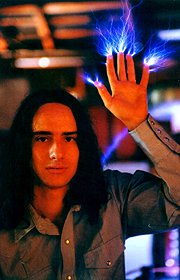Imagination is More Important Than Knowledge

You probably have a rich imaginative life, whether you notice it or not. One expert, Eric Klinger, estimates that daydreams constitute about half of the thousands of thoughts and images we produce in a day. Yet most people feel ashamed of their daydreams. In everyday social life, wise people are assumed to be realists who keep “their feet on the ground.” You’ve been scolded, no doubt, for indulging in fantasy; you’re not even supposed to speculate much about what might have been. Yet your imagination is an indispensable aspect of realistic, practical thinking, not its antithesis.
“Imagination is more important than knowledge,” declares Albert Einstein on a poster that can be found in thousands of university dormitories. His great breakthrough came from imagining what he might see if he were riding a photonthrough the depths of space
Dreams and daydreams sometimes yield practical solutions to empirical problems. Einstein even said that “the gift of fantasy has meant more to me than my talent for absorbing positive knowledge.” He was not the only scientist who used fantasy in that way. The brilliance of creative researchers can be attributed to their ability to play with fantasies and dreams in the back of their minds, yet notice the images and bring them up into consciousness, work through the practical implications, and then put the ideas into a form that others can see. Here are three stories about other scientific geniuses whose imaginations gave them the greatest research insight of their lives.
The chemist Friedrich August Kekulé had been working in 1858 on the structure of organic compounds when he dozed off in front of his fireplace. He imagined atoms in
“long rows sometimes more closely fitted together all twining and twisting in snake-like motion. But look! What was that? One of the snakes had seized hold of its own tail, and the form whirled mockingly before my eyes. As if by a flash of lightning I awoke; and this time also I spent the rest of the night in working out the consequences of the hypothesis.”
This image of a snake biting its own tail revealed to him the structure of the benzene ring — the basis of all organic chemistry.
Another example is Nikola Tesla, one of the greatest inventors of all time, who is best known for discovering alternating current. (See photo of his shocking invention.) Tesla’s fantasy life was extraordinary. In his autobiography, he described visions that seemed so real that he could not always tell which ones were tangible and which ones not. Yet he was far from being mad, and indeed he put his visualizing capacities to work in the realm of physics. He explained in his autobiography:
“When I get an idea, I start at once building it up in my imagination. I change the construction, make improvements and operate the device in my mind. It is absolutely immaterial to me whether I run my turbine in thought or test it in my shop.... When I have gone so far as to embody in the invention every possible improvement I can think of and see no fault anywhere, I put into concrete form this final product of my brain. Invariably my device works as I conceived that it should, and the experiment comes out exactly as I planned it. In twenty years there has not been a single exception.”
And finally, my third example is Elias Howe, who invented the sewing machine in 1845. He had been attempting to invent such an instrument for years. One night he fell asleep at his workbench and dreamed of being captured by cannibals in Africa. They carried him home on a pole and dumped him into a pot, preparing to boil him. Although he managed to loosen the ropes from his hands and tried to climb out of the pot, the cannibals kept poking him down again with their spears, which had holes in the points.
Howe awoke with a shock. “Holes in the points!” he exclaimed. “That's it!” Of course, the solution to his problem was to put the hole in the point of the needle, instead of at the back, as in needles for hand sewing.
So, on the basis of these three stories, I hereby grant permission for you to fantasize all you want — at least in your spare time. Please keep me posted about your forthcoming scientific discoveries.



0 Comments:
Post a Comment
<< Home